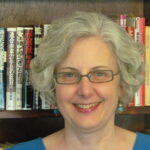Meet a Fellow: Teresa A. Goddu
 Meet Teresa A. Goddu, a 2021-2022 RPW Center Faculty Fellow. This year’s group is exploring the theme of “Environments.”
Meet Teresa A. Goddu, a 2021-2022 RPW Center Faculty Fellow. This year’s group is exploring the theme of “Environments.”
What does the phrase “Environments” mean to you?
I am thinking about our keyword “environments” specifically in terms of landscape—both actual and imagined. Landscape is such a rich terrain through which to investigate the history and culture of place, its figurative meanings as well as its imagined possibilities. At once an archive of the Anthropocene and a symbolic imaginary, landscape provides a genealogy of our present predicament as well as counter cartographies. By grounding its stories in physical geographies, U.S. climate fiction both details the histories that produced the climate crisis and envisions ways to navigate it. In mapping this emerging genre, I hope to establish U.S. climate fiction as a significant feature of the contemporary literary landscape and show how it is situated within the form’s larger global geography.
What initially sparked your interest in your research?
I began noticing how the antislavery movement was being invoked by climate activists as a model. This led me to consider what social change my own moment demanded of me and how I might bring my gifts—as administrator, teacher, and writer—to bear on the issue.
For the first twenty years of my career, my research focus was on nineteenth-century literature and culture with an emphasis on race and slavery. About a decade ago as I was becoming ever more aware of the climate crisis, I began focusing my attention on climate and the environment: first through administration, then through teaching, and now through my research.
As Director of the American Studies Program, I designed and ran a three-year “Sustainability Project” to embolden Vanderbilt’s efforts on the environment. This project produced the minor in Environmental and Sustainability Studies which will become the Climate and Environmental Studies major in Fall 2022. As a teacher, I began offering courses on contemporary climate fiction and the environmental humanities.
Then, as I was finishing a book on the nineteenth-century U.S. antislavery movement, I began noticing how the antislavery movement was being invoked by climate activists as a model. This led me to consider what social change my own moment demanded of me and how I might bring my gifts—as administrator, teacher, and writer—to bear on the issue. It made sense to connect my long-standing concern with racial justice to the issue of climate justice and my interest in how literature can affect social change to the climate crisis. I am now working on a book about contemporary U.S. climate fiction, mapping its meanings through the lens of landscape.
What was your first job and what did you learn from it?
My first job—besides babysitting which you were allowed to do at a frighteningly young age in the 1970s when I was growing up—was picking strawberries when I was twelve years old. For three weeks in June, I would wake up before the sun and ride my bike a mile in the early morning light down a rural winding road to a pick-up spot where I would climb into the cargo bed of a truck to be transported to the fields. There I would bend over the strawberry plants until mid-day, picking the fruit as quickly as I could to the sound of a boom box echoing down the rows. I believe I was paid five cents per quart. I learned early on the meaning of hard work, the value of money earned, the quiet beauty of dawn, and the deep comradery of working side-by-side with others.
Teresa A. Goddu is Associate Professor of English and American Studies at Vanderbilt University. She specializes in nineteenth-century American literature and culture, slavery and antislavery, as well as print, material, and visual culture. She is the author of two books: Gothic America: Narrative, History, and Nation (Columbia University Press) and Selling Antislavery: Abolition and Mass Media in Antebellum America (University of Pennsylvania Press). Her current research focuses on the environmental humanities, specifically contemporary climate fiction.
